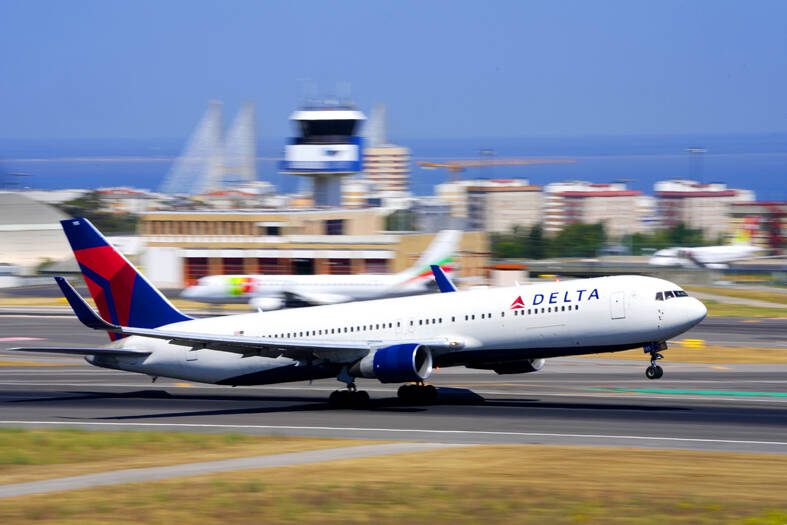After years of stumbles and weak results, Boeing Co on Wednesday said it expects to return to operational health and a more robust financial performance by the middle of this decade.
The aerospace giant — which has reported losses for the past three years — guided investors to 2025 or 2026 as when they should expect a financial performance resembling those the company posted prior to issues with the 737 MAX and the COVID-19 pandemic.
Investors cheered the outlook, sending shares up more than 7 percent at one point as Boeing signaled a more normal level of production and plane deliveries within the foreseeable future. Shares finished 2.8 percent higher at US$147.41.

Photo: AP
“We are on the right path to return to the operational and financial strength we expect of ourselves,” Boeing chief executive officer Dave Calhoun said at the outset of the company’s first investors’ day since 2016.
Boeing’s difficult period began in October 2018 with a deadly Lion Air crash of a 737 MAX, the first of two fatal crashes of the plane that together claimed nearly 350 lives and led to a global grounding of more than a year and a half.
The company’s problems mushroomed when the COVID-19 pandemic decimated global travel beginning in 2020.
Demand has recovered strongly and the 737 MAX has been cleared for service by most leading regulators.
However, Boeing has struggled to fully exploit the improving environment due in part to supply chain problems and heavier scrutiny from US air safety regulators. These issues have forced the company to curtail production and delayed the certification of new aircraft.
The forecast released on Wednesday includes a gradual improvement in Boeing plane deliveries and production next year and in 2024, and hitting its stride after that, boosting revenues.
Boeing executive vice president Stan Deal told analysts that he expects to liquidate most of a backlog of undelivered planes by 2024, with a few spilling into 2025. This includes 787 Dreamliner planes, in addition to 737 MAX aircraft.
Deal also updated the timeframe on the certification of the 737 MAX 10, its latest version of the plane, saying the aircraft should be cleared for service by late next year or early 2024.
The company projected free cash flow, a closely watched benchmark of financial health, rising to US$3 billion to U$5 billion next year from the U$1.5 billion to US$2 billion range this year.
It said free cash flow would surge to about US$10 billion in 2024 and 2026, much closer to the US$13.6 billion Boeing notched in 2018.

Semiconductor shares in China surged yesterday after Reuters reported the US had ordered chipmaking giant Taiwan Semiconductor Manufacturing Co (TSMC, 台積電) to halt shipments of advanced chips to Chinese customers, which investors believe could accelerate Beijing’s self-reliance efforts. TSMC yesterday started to suspend shipments of certain sophisticated chips to some Chinese clients after receiving a letter from the US Department of Commerce imposing export restrictions on those products, Reuters reported on Sunday, citing an unnamed source. The US imposed export restrictions on TSMC’s 7-nanometer or more advanced designs, Reuters reported. Investors figured that would encourage authorities to support China’s industry and bought shares

FLEXIBLE: Taiwan can develop its own ground station equipment, and has highly competitive manufacturers and suppliers with diversified production, the MOEA said The Ministry of Economic Affairs (MOEA) yesterday disputed reports that suppliers to US-based Space Exploration Technologies Corp (SpaceX) had been asked to move production out of Taiwan. Reuters had reported on Tuesday last week that Elon Musk-owned SpaceX had asked their manufacturers to produce outside of Taiwan given geopolitical risks and that at least one Taiwanese supplier had been pushed to relocate production to Vietnam. SpaceX’s requests place a renewed focus on the contentious relationship Musk has had with Taiwan, especially after he said last year that Taiwan is an “integral part” of China, sparking sharp criticism from Taiwanese authorities. The ministry said

US President Joe Biden’s administration is racing to complete CHIPS and Science Act agreements with companies such as Intel Corp and Samsung Electronics Co, aiming to shore up one of its signature initiatives before US president-elect Donald Trump enters the White House. The US Department of Commerce has allocated more than 90 percent of the US$39 billion in grants under the act, a landmark law enacted in 2022 designed to rebuild the domestic chip industry. However, the agency has only announced one binding agreement so far. The next two months would prove critical for more than 20 companies still in the process

CHANGING JAPAN: Nvidia-powered AI services over cellular networks ‘will result in an artificial intelligence grid that runs across Japan,’ Nvidia’s Jensen Huang said Softbank Group Corp would be the first to build a supercomputer with chips using Nvidia Corp’s new Blackwell design, a demonstration of the Japanese company’s ambitions to catch up on artificial intelligence (AI). The group’s telecom unit, Softbank Corp, plans to build Japan’s most powerful AI supercomputer to support local services, it said. That computer would be based on Nvidia’s DGX B200 product, which combines computer processors with so-called AI accelerator chips. A follow-up effort will feature Grace Blackwell, a more advanced version, the company said. The announcement indicates that Softbank Group, which until early 2019 owned 4.9 percent of Nvidia, has secured a